"The past is a different country; people did things differently then." The Go-Between by LP Hartley.
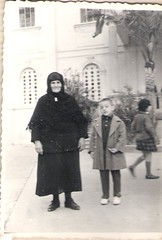 I never lived in a village when I was your age, I always lived in the town, and I never lived in a big house like you did, I always lived in the old cold dilapidated houses that my parents used to rent, so it was a dream of mine to build a big warm house one day and live comfortably in it, like you do. And because I didn’t have any brothers and sisters like you do, I felt very lonely. So I would look forward to the end of the week on Friday, and I'd get all my homework done, and I'd be a good boy because then I'd be allowed to go to the village in Fournes to stay with Yiayia in her house. Every Saturday morning, my father would put me on the bus by myself and send me off to Yiayia where I would stay for the weekend. The bus would stop outside the kafeneia, and Yiayia was always there, waiting to pick me up. I'd always tell her that it wasn't necessary for her to wait for me, and that I could get to the house by myself, it was only a short walk, but she was always waiting for me at my stop, and when I got off the bus, we'd walk back to her house together.
I never lived in a village when I was your age, I always lived in the town, and I never lived in a big house like you did, I always lived in the old cold dilapidated houses that my parents used to rent, so it was a dream of mine to build a big warm house one day and live comfortably in it, like you do. And because I didn’t have any brothers and sisters like you do, I felt very lonely. So I would look forward to the end of the week on Friday, and I'd get all my homework done, and I'd be a good boy because then I'd be allowed to go to the village in Fournes to stay with Yiayia in her house. Every Saturday morning, my father would put me on the bus by myself and send me off to Yiayia where I would stay for the weekend. The bus would stop outside the kafeneia, and Yiayia was always there, waiting to pick me up. I'd always tell her that it wasn't necessary for her to wait for me, and that I could get to the house by myself, it was only a short walk, but she was always waiting for me at my stop, and when I got off the bus, we'd walk back to her house together.
My cousins lived in the village too, so I'd have someone to play with whenever I visited. There was never any shortage of company, and time flew by so quickly that before I knew it, it was time to go back home. I was a little older than D, but just a little younger than G, so we all played together in Yiayia's yard. It always felt like a big yard to me because I was so small then, just like you, but the house was very big, it had many rooms on two different floors, so it was really like two houses in one. That's where G and D lived with their parents, my uncle and aunt. We played hide'n'seek in the different rooms, we played games in the yard, we visited other children in the neighbourhood, we kept ourselves warm by the open fire in the winter, we went for walks to the orchards, we picked fruit straight off the trees and ate them there and then. I loved going to the village. It was my second home, and all my cousins lived there, like most still do now.
My husband's mother's family lived in this house; below the house is a basement, which was his grandmother's home. The entrance opened to the kitchen and stables, where the hearth (παρασιά) was located. Another small room, with an indoor staircase, lead to the οντά, the top room of a Cretan house (οντά is a Turkish word); to get there, you open the hatch door (known as a ρεμπάρτα - probably another Turkish word).
In the evening, whenever I went to stay with her, Yiayia always cooked a batch of fried potatoes in the parasia especially for me. Potatoes fried in olive oil in the parasia taste so good, better than how we cook them on a gas stove. I don't know why they tasted so good. My parents used to say that the air was better there, and it gave the fried potatoes a better taste. The parasia also kept the house warm, because in the past, winters were much colder than what they are now. So the fire cooked our food and kept us warm. Yiayia's house didn't have electricity when I was very young. Even when electricity came to the village, she still preferred to use a λυχναράκι for light. She'd light one up with olive oil when it got dark. There was no television, so at night, we'd all go to sleep. There wasn't anything else to do after that, anyway.
At night, I slept in the οντά, which is what we called the upper room of a village house, if it had a second floor, and most did. Some houses had stairs inside the house to get to the oda, but Yiayia's house had indoor stairs. To get to the top floor, we had to climb up the stairs and then open a hatch, which is where Yiayia had her bedroom. She always told me to sleep on the bed, while she slept on the floor, but I never wanted to sleep on the bed. I loved sleeping on the floor in her house. I never remember it as uncomfortable. It's just like how I sleep in the mitato when I go away for hunting weekends in the mountains.
One day, I was playing with my cousin S at his house. S was born and raised in the village. He was a bit of a rough boy, as most boys are when they grow up in the countryside, where there aren't a lot of people, and the neighbours aren't close by, and you can shout all you like, because nobody will hear you. S was also a big boy, he was a bit stronger than I was. On that day, we played a little rough, and he ended up throwing mud at me. I didn't get to throw any mud back onto him, because, as I said, he was bigger than me, and when he squeezed my hand, it felt like he was kneading it into bread dough, really!
So after he threw the mud at me, I left his house and went back to Yiayia's, and I remember G came out and saw me crying, and when she asked me why I was crying, I told her that S threw mud at me, and I got my trousers dirty. I always liked to keep my clothes clean, because in those days, we didn't have a lot of clothes like you do in your wardrobes, and we didn't even have washing machines to keep them clean regularly. My mother – your yiayia – had to wash all my clothes by hand. So when I got my clothes dirty, I got very upset about it because I didn't have any other clothes to change in. G was very good to me, just like she still is to all of us, and she told me she’d clean my trousers for me. But I told her I wouldn't take them off because I had no others to wear. But she said it didn't matter, she'd give me some clothes to wear, and she'd make sure my trousers dried very quickly. So I took off my trousers and G took them and began washing them. Then D came in carrying a skirt. She told me to wear it, because neither of the girls had any trousers. Girls never wore trousers in those days in the village. So I had to wear a skirt until my trousers were dry! G washed my trousers and hung them out to dry. D went outside to play in the yard and told me to come out with her, but I said to her "Are you nuts?" If I went out to the yard to play with her, S might come by and see me wearing a skirt, and then I'd be dead meat, so I stayed in the house that day.
On Sunday morning I’d go to church with Yiayia and then when we came home, we’d eat roast meat with potatoes which she'd cooked in a wood-fired oven. That was my favorite meal of the week - it still is! - even more delicious than the fried potatoes we'd have the night before. On Sunday afternoon, I’d take the bus back to the town, and go back home to my parents. And then, for the rest of the week, I always looked forward to Friday, so that I could go back to Yiayia's house and play with my cousins at the weekend.
As promised today, the winner of the CSN gift voucher. I used random.org to generate a number from 1 to 9, and the lucky winner is No. 7, Debbie! Thanks to all for taking part.
©All Rights Reserved/Organically cooked. No part of this blog may be reproduced and/or copied by any means without prior consent from Maria Verivaki.
 I never lived in a village when I was your age, I always lived in the town, and I never lived in a big house like you did, I always lived in the old cold dilapidated houses that my parents used to rent, so it was a dream of mine to build a big warm house one day and live comfortably in it, like you do. And because I didn’t have any brothers and sisters like you do, I felt very lonely. So I would look forward to the end of the week on Friday, and I'd get all my homework done, and I'd be a good boy because then I'd be allowed to go to the village in Fournes to stay with Yiayia in her house. Every Saturday morning, my father would put me on the bus by myself and send me off to Yiayia where I would stay for the weekend. The bus would stop outside the kafeneia, and Yiayia was always there, waiting to pick me up. I'd always tell her that it wasn't necessary for her to wait for me, and that I could get to the house by myself, it was only a short walk, but she was always waiting for me at my stop, and when I got off the bus, we'd walk back to her house together.
I never lived in a village when I was your age, I always lived in the town, and I never lived in a big house like you did, I always lived in the old cold dilapidated houses that my parents used to rent, so it was a dream of mine to build a big warm house one day and live comfortably in it, like you do. And because I didn’t have any brothers and sisters like you do, I felt very lonely. So I would look forward to the end of the week on Friday, and I'd get all my homework done, and I'd be a good boy because then I'd be allowed to go to the village in Fournes to stay with Yiayia in her house. Every Saturday morning, my father would put me on the bus by myself and send me off to Yiayia where I would stay for the weekend. The bus would stop outside the kafeneia, and Yiayia was always there, waiting to pick me up. I'd always tell her that it wasn't necessary for her to wait for me, and that I could get to the house by myself, it was only a short walk, but she was always waiting for me at my stop, and when I got off the bus, we'd walk back to her house together.
This photographic video sequence depicts scenes from my husband's family's roots in the village of Fournes, both past and present. The narrative is told in a very old-fashioned style, but the photos depict very well the old grandeur that once characterised this village, the last one located on flat terrain on the road to Samaria Gorge before it begins to bend and turn.
Segment 5.00 shows a war memorial with all the names of the villagers of the region who died in WW2.
Segment 5.23-5.35 shows two brothers whose bodies my mother-in-law first found in a ditch, killed by the Nazis.
Segment 7.07 shows what malnourished Cretan children during WW2, after all the island's food was confiscated by the Nazis.
Segment 5.00 shows a war memorial with all the names of the villagers of the region who died in WW2.
Segment 5.23-5.35 shows two brothers whose bodies my mother-in-law first found in a ditch, killed by the Nazis.
Segment 7.07 shows what malnourished Cretan children during WW2, after all the island's food was confiscated by the Nazis.
My cousins lived in the village too, so I'd have someone to play with whenever I visited. There was never any shortage of company, and time flew by so quickly that before I knew it, it was time to go back home. I was a little older than D, but just a little younger than G, so we all played together in Yiayia's yard. It always felt like a big yard to me because I was so small then, just like you, but the house was very big, it had many rooms on two different floors, so it was really like two houses in one. That's where G and D lived with their parents, my uncle and aunt. We played hide'n'seek in the different rooms, we played games in the yard, we visited other children in the neighbourhood, we kept ourselves warm by the open fire in the winter, we went for walks to the orchards, we picked fruit straight off the trees and ate them there and then. I loved going to the village. It was my second home, and all my cousins lived there, like most still do now.
My husband's mother's family lived in this house; below the house is a basement, which was his grandmother's home. The entrance opened to the kitchen and stables, where the hearth (παρασιά) was located. Another small room, with an indoor staircase, lead to the οντά, the top room of a Cretan house (οντά is a Turkish word); to get there, you open the hatch door (known as a ρεμπάρτα - probably another Turkish word).
In the evening, whenever I went to stay with her, Yiayia always cooked a batch of fried potatoes in the parasia especially for me. Potatoes fried in olive oil in the parasia taste so good, better than how we cook them on a gas stove. I don't know why they tasted so good. My parents used to say that the air was better there, and it gave the fried potatoes a better taste. The parasia also kept the house warm, because in the past, winters were much colder than what they are now. So the fire cooked our food and kept us warm. Yiayia's house didn't have electricity when I was very young. Even when electricity came to the village, she still preferred to use a λυχναράκι for light. She'd light one up with olive oil when it got dark. There was no television, so at night, we'd all go to sleep. There wasn't anything else to do after that, anyway.
The παρασιά is usually an outdoor fire used for cooking, although it can also be found indoors as in the photo set above.
Mother and son
Cousin S, watching me take his photo at the Botanical Park Restaurant on the village road out of Fournes.
So after he threw the mud at me, I left his house and went back to Yiayia's, and I remember G came out and saw me crying, and when she asked me why I was crying, I told her that S threw mud at me, and I got my trousers dirty. I always liked to keep my clothes clean, because in those days, we didn't have a lot of clothes like you do in your wardrobes, and we didn't even have washing machines to keep them clean regularly. My mother – your yiayia – had to wash all my clothes by hand. So when I got my clothes dirty, I got very upset about it because I didn't have any other clothes to change in. G was very good to me, just like she still is to all of us, and she told me she’d clean my trousers for me. But I told her I wouldn't take them off because I had no others to wear. But she said it didn't matter, she'd give me some clothes to wear, and she'd make sure my trousers dried very quickly. So I took off my trousers and G took them and began washing them. Then D came in carrying a skirt. She told me to wear it, because neither of the girls had any trousers. Girls never wore trousers in those days in the village. So I had to wear a skirt until my trousers were dry! G washed my trousers and hung them out to dry. D went outside to play in the yard and told me to come out with her, but I said to her "Are you nuts?" If I went out to the yard to play with her, S might come by and see me wearing a skirt, and then I'd be dead meat, so I stayed in the house that day.
My husband's yiayia cooked like my children's yiayia still does, even now that she's in her eighties.
As promised today, the winner of the CSN gift voucher. I used random.org to generate a number from 1 to 9, and the lucky winner is No. 7, Debbie! Thanks to all for taking part.
©All Rights Reserved/Organically cooked. No part of this blog may be reproduced and/or copied by any means without prior consent from Maria Verivaki.
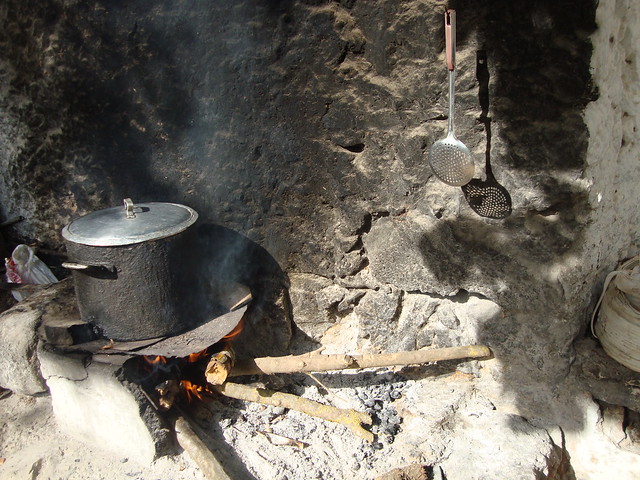
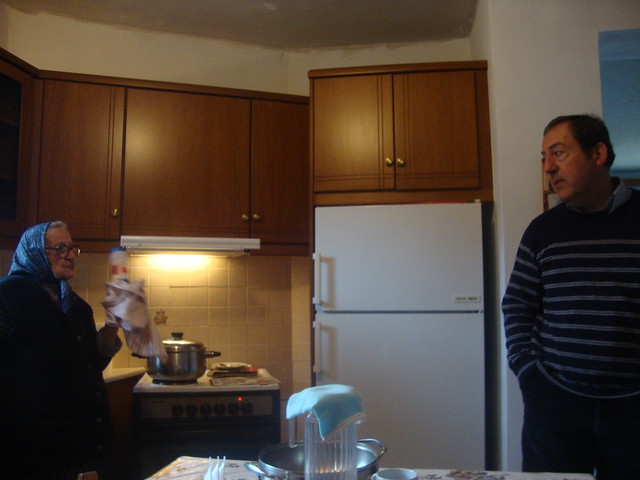
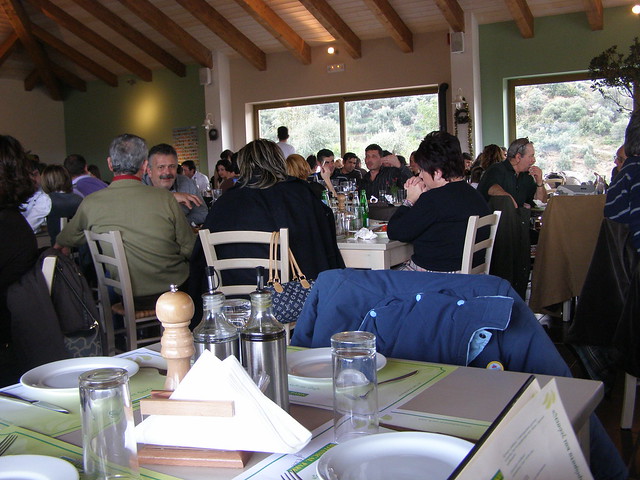
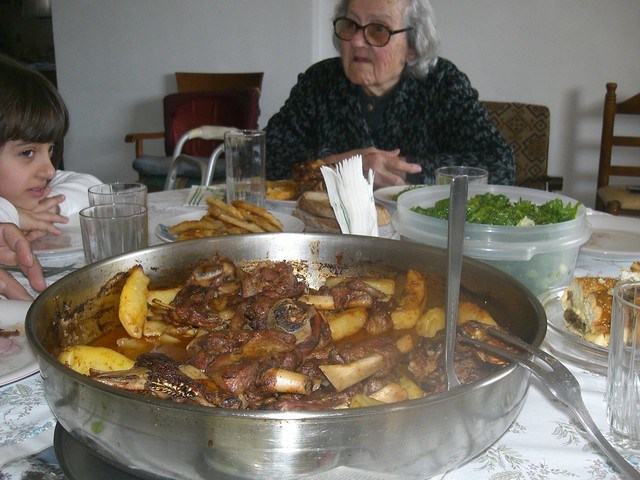
Wonderful stories! Your children are very lucky that there is someone to tell them these things.
ReplyDeleteBoth my parents have died and also, of course, all the grandparents. Those wonderful old stories will be lost forever now. I can relate a few to my grown children but I wonder....will they tell good stories to their (not even born yet, if ever)
children? Life has changed so much in the States. That makes me very sad.
A great story Maria...and I have to say that roast cooked in a wood fired oven looks spectacular! Is it katsikaki?
ReplyDeleteHow many things came in my mind!!!
ReplyDeleteGrandmother's home in Archanes, the parasia, the fried potatoes... So many memories!!!
I really miss her. I tell my kids many stories that happened to me or i heard from grandparents.
The stories of our family are our roots and they're better than fairytales.
I missed you and your posts.